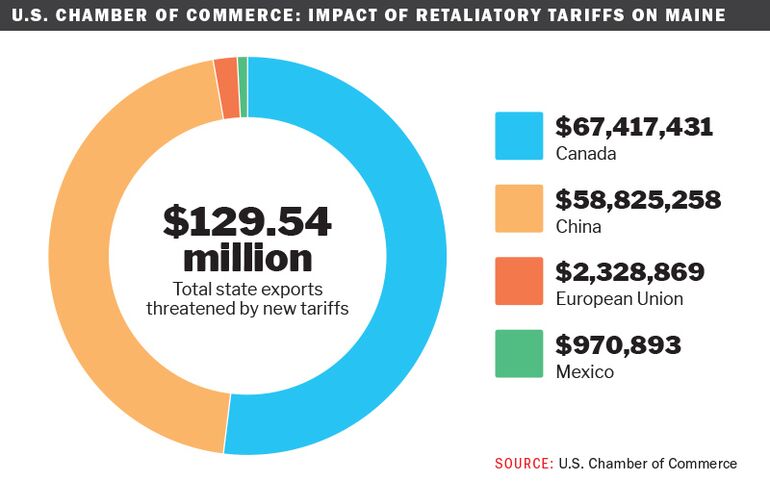Processing Your Payment
Please do not leave this page until complete. This can take a few moments.
- News
-
Editions
View Digital Editions
Biweekly Issues
- Nov. 17, 2025
- November 03, 2025
- October 20, 2025
- October 6, 2025
- September 22, 2025
- September 8, 2025
- + More
Special Editions
- Lists
- Viewpoints
-
Our Events
Event Info
Award Honorees
- Calendar
- Biz Marketplace
U.S. Chamber comes out against new tariffs, details impact on Maine

A new analysis by the U.S. Chamber of Commerce shows that roughly $130 million of Maine exports are threatened by new tariffs already imposed or threatened by China, the European Union, Mexico and Canada on American-made products in retaliation for new tariffs imposed by the Trump administration.
To put that in context, the Maine International Trade Center reported that last year, 2,262 Maine companies exported $2.7 billion in goods and services to 176 countries. Trade supports 180,500 (nearly 1 in 4) Maine jobs, according to MITC, and Maine jobs related to trade have increased by 25.9% since 2009, while overall job growth was just 0.3% in the same time frame.
The U.S. Chamber — which is the world’s largest business federation representing the interests of more than 3 million businesses of all sizes, sectors and regions, as well as state and local chambers and industry associations — compiled its analysis using data on state exports from the U.S. Department of Commerce and data on U.S. exports subject to foreign tariffs from the official government sources of China, the EU, Mexico, and Canada.
“The analysis shows how much of each state’s exports are threatened by retaliatory tariffs, highlights each state’s hardest-hit products, and shows the total number of jobs supported by global trade in each state, illustrating exactly what American families and consumers stand to lose in a potential trade war,” the chamber stated in a news release accompanying its analysis.
For Maine, the chamber’s analysis broke down the estimated $130 million in total state exports that are threatened by new tariffs:
- Canada: $67.4 million of exports threatened by new tariffs on prepared or preserved chicken meat; maple sugar and maple syrup; and motorboats.
- China: $55.5 million of exports threatened by new tariffs on lobster (live, fresh or chilled); fruit and nuts (frozen); and lobster (frozen).
- European Union: $2.3 million of exports threatened by new tariffs on yachts, rowboats and canoes; cooking appliances; articles made of iron or steel.
- Mexico: $970,893 of exports threatened by new tariffs on cranberries, iron, non-alloy steel, other bars and rods and other alloy steel.
“Tariffs are beginning to take a toll on American businesses, workers, farmers, and consumers as overseas markets close to American-made products and prices increase here at home,” said U.S. Chamber President and CEO Thomas J. Donohue. “Tariffs are simply taxes that raise prices for everyone. Tariffs that beget tariffs that beget more tariffs only lead to a trade war that will cost American jobs and economic growth.”
The chamber reported that of this week, approximately $75 billion worth of U.S. exports will be subject to retaliatory tariffs.
“Escalating tit-for-tat trade actions promise to raise costs on American businesses and consumers, making it harder for families to afford everyday products like toilet paper, condiments, coffee, and ballpoint pens, which have been targeted for retaliation,” the chamber stated.
States that will be hit hardest
The analysis identified several states’ economies that stand to be especially harmed by an emerging trade war, including:
- Alabama: In total, $3.6 billion of state exports are threatened by retaliatory tariffs from China, the European Union, Mexico and Canada. Steel products, aluminum products, and soybeans are among Alabama’s hardest hit.
- Michigan: In total, $2.3 billion of state exports will be subject to retaliatory tariffs. Steel and aluminum products, as well as automobiles, are among Michigan’s hardest hit.
- Pennsylvania: In total, $1.7 billion of state exports are threatened by retaliatory tariffs. Steel products, iron products, coffee, and pastries are all among Pennsylvania’s hardest-hit products.
- South Carolina: In total, $3 billion of state exports will be subject to retaliatory tariffs. Lawn mowers, steel products, iron products are among South Carolina’s hardest-hit exports.
- Texas: In total, $3.9 billion of state exports will be subject to retaliatory tariffs. Pork and whiskey are among Texas’s hardest-hit exports.
- Wisconsin: In total, $1 billion of state exports are threatened by retaliatory tariffs. Cheese, toilet paper, and ginseng are among Wisconsin’s hardest-hit products.
The chamber is urging businesses and consumers to “send a message to Congress” asking their elected representative to call on the Trump administration to reconsider its recent and proposed trade actions, with the chamber offering these reasons for doing so:
- “New tariffs on steel, aluminum, and Chinese imports, as well as the potential for additional tariffs on autos and auto parts, have pushed us to the brink of a global trade war. Canada, Mexico, the EU, and China have already retaliated — or announced plans to retaliate — with billions of dollars in tariffs on American-made products.”
- “Millions of U.S. jobs depend on America’s ability to trade with other countries. Half of all U.S. manufacturing jobs depend on exports, and one in three acres of American farmland is planted for international sales. But recent and proposed trade actions by the Trump administration threaten as many as 2.6 million American jobs and will stymie our economic resurgence.”
- “Imposing tariffs on imported goods will hit American consumers and businesses — including manufacturers, farmers, ranchers, and technology companies — with higher costs on commonly used products and materials.”
- “Tariffs are a tax on American consumers and businesses. Tariffs are the wrong approach to address unfair trade practices.”
“The administration is threatening to undermine the economic progress it worked so hard to achieve,” said Donohue. “We should seek free and fair trade, but this is just not the way to do it. It’s time to reverse course and adopt smarter, more effective approaches for addressing trade concerns with commercial partners.”
Mainebiz web partners

The Giving Guide
The Giving Guide helps nonprofits have the opportunity to showcase and differentiate their organizations so that businesses better understand how they can contribute to a nonprofit’s mission and work.
Learn More
Work for ME
Work for ME is a workforce development tool to help Maine’s employers target Maine’s emerging workforce. Work for ME highlights each industry, its impact on Maine’s economy, the jobs available to entry-level workers, the training and education needed to get a career started.
Learn More
Groundbreaking Maine
Whether you’re a developer, financer, architect, or industry enthusiast, Groundbreaking Maine is crafted to be your go-to source for valuable insights in Maine’s real estate and construction community.
Learn more-
The Giving Guide
The Giving Guide helps nonprofits have the opportunity to showcase and differentiate their organizations so that businesses better understand how they can contribute to a nonprofit’s mission and work.
-
Work for ME
Work for ME is a workforce development tool to help Maine’s employers target Maine’s emerging workforce. Work for ME highlights each industry, its impact on Maine’s economy, the jobs available to entry-level workers, the training and education needed to get a career started.
-
Groundbreaking Maine
Whether you’re a developer, financer, architect, or industry enthusiast, Groundbreaking Maine is crafted to be your go-to source for valuable insights in Maine’s real estate and construction community.
ABOUT
NEW ENGLAND BUSINESS MEDIA SITES
No articles left
Get access now
In order to use this feature, we need some information from you. You can also login or register for a free account.
By clicking submit you are agreeing to our cookie usage and Privacy Policy
Already have an account? Login
Already have an account? Login
Want to create an account? Register
Get access now
In order to use this feature, we need some information from you. You can also login or register for a free account.
By clicking submit you are agreeing to our cookie usage and Privacy Policy
Already have an account? Login
Already have an account? Login
Want to create an account? Register







Comments